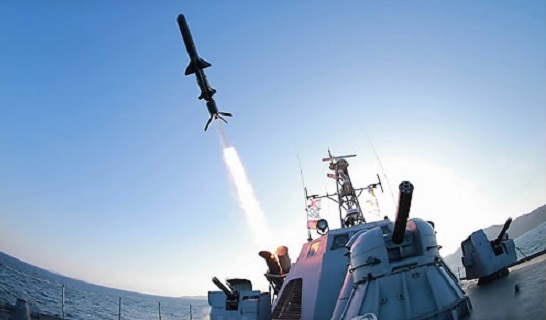North Korea showcases area-denial capability with cruise missile launch
North Korea fired multiple anti-ship cruise missiles, South Korea’s military said Thursday, in an apparent display of advanced defense capacity against US military assets near the peninsula.
Classified as short-range surface-to-ship cruise missiles, the projectiles lifted off from a launch site in the North’s coastal city of Wonsan and flew at least 200 kilometers with an apogee of 2 kilometers before falling into the East Sea, according to Seoul’s Joint Chiefs of Staff.
The launch was seen as the regime’s latest effort to demonstrate its “anti-access, area-denial (A2AD)” capabilities, a military strategy designed to block the enemy’s strategic assets from entering its operational areas. The Chinese Navy has employed the strategy against US maritime supremacy in the region.
 |
| (Yonhap) |
“We believe North Korea has demonstrated its anti-denial deterrence capabilities in response to the joint military exercise in the East Sea,” where USS Carl Vinson and Ronald Reagan participated in a joint exercise last month, JCS Spokesperson Col. Roh Jae-cheon said in a briefing.
President Moon Jae-in expressed his strong condemnation, warning that Pyongyang would only confront international isolation and economic hardship with the latest series of missile tests.
“The only things North Korea can gain from these provocations are economic isolation and economic difficulties,” the president was quoted as saying during the National Security Council meeting he presided over for the first time since taking office on May 10.
The NCS meeting was called at 2 p.m., hours after the JCS announcement of the missile launch. Cheong Wa Dae said serious debate is needed because the cruise missile launch could pose a “direct threat” to national security. Although there was no immediate comment from North Korea, military analysts suspected the missiles are a new version of anti-ship cruise missile, which look similar to the Kumsong-2 cruise missile revealed at the North’s military parade on April 15.
The launch came 10 days after North Korea fired what analysts called a variant of a Scud-type missile, designed to target maritime and ground assets. The North claimed the missile was equipped with a precision control guidance system.
In a statement, Seoul’s Foreign Ministry said it would take a stern response against North Korea’s provocation and that the communist regime should halt its bellicose actions immediately. The ministry, however, reserved comments as to whether the missile test constitutes violations of international laws.
Chinese Foreign Ministry urged North Korea not to escalate tension, calling for restraint from countries in the region.
“Under the current environment, the countries concerned should not provoke each other or take any action that could escalate regional tensions,” China’s foreign ministry spokeswoman Hua Chunying said.
The missile launch was also part of the North’s efforts to increase diplomatic leverage for potential negotiations over the nuclear program, the JCS said, as South Korea and the US are expected to hold a first summit this month.
North Korea is said to have conducted five missile tests since South Korean President Moon Jae-in took office on May 10. Moon is known for advocating a softening stance on Pyongyang by encouraging aid groups to visit the country.
The North has demonstrated its advanced missile capability with a series of ballistic missile launches aiming to target the US mainland. Before Thursday’s test, its latest launches included an intermediate-range ballistic missile targeting Hawaii and Alaska, the Hwasung-12 and Pukguksung-2 medium-range ballistic missile, the KN-06 surface-to-air missile and a variant of Scud-type missiles.
By Yeo Jun-suk (jasonyeo@heraldcorp.com)
Source:koreaherald.com